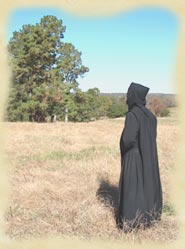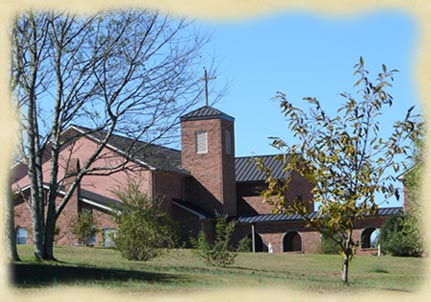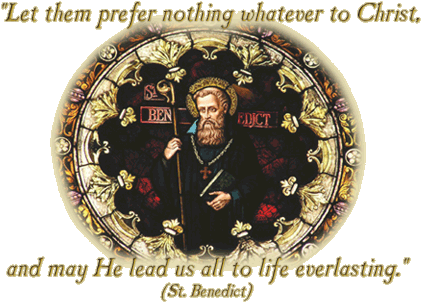

 an
was not created to live on earth for-ever. He was made for eternity. Since he
possesses an immortal soul, the way he lives his life on earth will determine
where and how he is to spend that eternity. Is it not wise, therefore, for him
to live, not for the passing things of time, but for that which will never end?
One day, perhaps sooner than he thinks, death will rob every man of his earthly
possessions. Therefore the earth and all its treasures must be reckoned as
nothing in exchange for union with God and the eternal joys of Heaven. To the
extent that a soul is sanctified and united to God by grace and love here on
earth, to that extent does that soul glorify God. And in the next life he will
have a more perfect vision of, and joy in, the wonders and the beauties of the
Most Holy Trinity in the Beatific Vision.
an
was not created to live on earth for-ever. He was made for eternity. Since he
possesses an immortal soul, the way he lives his life on earth will determine
where and how he is to spend that eternity. Is it not wise, therefore, for him
to live, not for the passing things of time, but for that which will never end?
One day, perhaps sooner than he thinks, death will rob every man of his earthly
possessions. Therefore the earth and all its treasures must be reckoned as
nothing in exchange for union with God and the eternal joys of Heaven. To the
extent that a soul is sanctified and united to God by grace and love here on
earth, to that extent does that soul glorify God. And in the next life he will
have a more perfect vision of, and joy in, the wonders and the beauties of the
Most Holy Trinity in the Beatific Vision.

 monastic vocation is a special call from God to dedicate one’s life completely
to His service and glory – to live for Him alone in a very special way. It is a
priceless gift, for God is offering the wonderful opportunity and privilege to
live in an environment which helps a man live the spiritual life to its
fullest. The life of a Benedictine monk is truly a wonderful life, a life of
great inner freedom, peace and joy. Nevertheless, it remains a difficult life,
particularly in these times of mass confusion and uncertainty. It is not a life
of cowardly refuge from the burdens of the world. It is a life of sacrifice. It
is a never-ending struggle for self-perfection. But fear not – if one has love,
good will and determination, all is quite possible. To him who trusts in the
Lord, Who gives strength to the weak and raises up those who fall, to him will
the roughs ways be made smooth, the bitter things turned into sweet, and the
hard things made easy.
monastic vocation is a special call from God to dedicate one’s life completely
to His service and glory – to live for Him alone in a very special way. It is a
priceless gift, for God is offering the wonderful opportunity and privilege to
live in an environment which helps a man live the spiritual life to its
fullest. The life of a Benedictine monk is truly a wonderful life, a life of
great inner freedom, peace and joy. Nevertheless, it remains a difficult life,
particularly in these times of mass confusion and uncertainty. It is not a life
of cowardly refuge from the burdens of the world. It is a life of sacrifice. It
is a never-ending struggle for self-perfection. But fear not – if one has love,
good will and determination, all is quite possible. To him who trusts in the
Lord, Who gives strength to the weak and raises up those who fall, to him will
the roughs ways be made smooth, the bitter things turned into sweet, and the
hard things made easy.

 he
very troubled condition in the Church today, and the devastation that has taken
place in our monasteries and convents, have broken the chain of the venerable
traditions that were found in all well regulated monasteries and convents of
former times. As a consequence, young men have few places to go where they can
experience, first hand, the atmosphere of living a traditional monastic life.
In most cases young candidates are forced to go to picture books to learn about
the life of the monk. But be warned – picture book beauty is a posed beauty: an
unreal beauty. It has very little in common with the real beauty – the quiet
beauty – of monastic life. The camera cannot capture the atmosphere of
austerity, patience, humility, obedience, self-sacrifice, and prayer that
permeates a life that is completely given to the service of God.
he
very troubled condition in the Church today, and the devastation that has taken
place in our monasteries and convents, have broken the chain of the venerable
traditions that were found in all well regulated monasteries and convents of
former times. As a consequence, young men have few places to go where they can
experience, first hand, the atmosphere of living a traditional monastic life.
In most cases young candidates are forced to go to picture books to learn about
the life of the monk. But be warned – picture book beauty is a posed beauty: an
unreal beauty. It has very little in common with the real beauty – the quiet
beauty – of monastic life. The camera cannot capture the atmosphere of
austerity, patience, humility, obedience, self-sacrifice, and prayer that
permeates a life that is completely given to the service of God.

 any
individuals who enter monastic life are not prepared for the fact that monastic
formation implies that one’s spiritual and psychological life must change and
grow. No matter how mature the individual is before he enters the Monastery, he
invariably finds his maturity being challenged by the demands of the schedule,
of communal charity, of the degree of silence and solitude, of obedience, of
humility, and of deepening his spiritual life according to the teaching of
monastic tradition. There will be a culture shock upon entering the
Monastery. Many become disenchanted with monastic life when they come
face-to-face with it. Either they expected to find a community of “angels”,
perfect in every way, floating around on clouds, or they wanted a life of
“greater mortification”, self-imposed, of course. Without a basic willingness
to be taught, indeed, to start all over again from the beginning, as it were,
the new member will find himself in a constant state of inner conflict as he
struggles to hang on to his habits of praying, his spirit of independence, his
self-will. etc., which are incompatible with, and a hindrance to, the new life
he has chosen. But if the desire and good will are present in the new member,
the period of monastic formation will be fruitful for the attainment of a
deeper level of faith, inner freedom, and joy.
any
individuals who enter monastic life are not prepared for the fact that monastic
formation implies that one’s spiritual and psychological life must change and
grow. No matter how mature the individual is before he enters the Monastery, he
invariably finds his maturity being challenged by the demands of the schedule,
of communal charity, of the degree of silence and solitude, of obedience, of
humility, and of deepening his spiritual life according to the teaching of
monastic tradition. There will be a culture shock upon entering the
Monastery. Many become disenchanted with monastic life when they come
face-to-face with it. Either they expected to find a community of “angels”,
perfect in every way, floating around on clouds, or they wanted a life of
“greater mortification”, self-imposed, of course. Without a basic willingness
to be taught, indeed, to start all over again from the beginning, as it were,
the new member will find himself in a constant state of inner conflict as he
struggles to hang on to his habits of praying, his spirit of independence, his
self-will. etc., which are incompatible with, and a hindrance to, the new life
he has chosen. But if the desire and good will are present in the new member,
the period of monastic formation will be fruitful for the attainment of a
deeper level of faith, inner freedom, and joy.
 he
first stages of joining our community vary from individual to individual. The
process usually begins with the writing of letters and/or telephone
conversations and/or coming for short visits during which the Abbot meets with
the individual. When an individual expresses a strong desire to seriously
pursue the possibility of a vocation in our Benedictine Community, that is, to
become a candidate, we ask him to make his arrangements and to settle all his
financial and personal obligations.
he
first stages of joining our community vary from individual to individual. The
process usually begins with the writing of letters and/or telephone
conversations and/or coming for short visits during which the Abbot meets with
the individual. When an individual expresses a strong desire to seriously
pursue the possibility of a vocation in our Benedictine Community, that is, to
become a candidate, we ask him to make his arrangements and to settle all his
financial and personal obligations.
Some necessary
qualities for monastic life:
·
Generally, we only
consider candidates who are between the ages of eighteen and thirty-five.
·
Love for God and
for one’s neighbor
·
A taste for
solitude, silence and prayer
·
A generous, willing
and determined spirit
·
An open and sincere
heart, eager to listen and to be taught
·
A mature
personality with stable moods and emotions
·
The ability to
persevere, to keep commitments and to take responsibility
·
Willingness to
submit to authority in humble obedience
·
A positive attitude
and a sense of humor
·
The ability to get
along with others in community
·
Good physical,
mental, and emotional health, and the stamina to endure hard work and a tight
regular schedule
·
Adaptability and
flexibility, and the willingness to change
·
Good moral
character
 he
voice of God calls to each of us in different ways, often through the desire of
our hearts or through the circumstances in which we find ourselves. Sometimes
we feel the desire from our earliest childhood, or sometimes it hits us
suddenly later in life, and often in the most unusual ways. But no one should
expect God to manifest His invitation in a miraclous manner. Usually, the idea
will enter into the mind like any other ordinary thought, but it will be more
or less persistent. One must not look for infallible certainty in this matter
of a vocation, for God wishes the soul to go to Him by the path of faith, hope,
love, complete trust and determination.
he
voice of God calls to each of us in different ways, often through the desire of
our hearts or through the circumstances in which we find ourselves. Sometimes
we feel the desire from our earliest childhood, or sometimes it hits us
suddenly later in life, and often in the most unusual ways. But no one should
expect God to manifest His invitation in a miraclous manner. Usually, the idea
will enter into the mind like any other ordinary thought, but it will be more
or less persistent. One must not look for infallible certainty in this matter
of a vocation, for God wishes the soul to go to Him by the path of faith, hope,
love, complete trust and determination.
 If
you think that Almighty God may be calling you to this life, or if you are not
sure, and would like to know more about monastic life, we encourage you to
contact the Vocation Director at Christ the King Abbey. Whether a
candidate pursues the Holy Priesthood will depend upon the individual and the
decision of the Abbot. Since the monastic and spiritual life of the monks and
nuns are so very similar, it is recommended that one reads the Nun's sections
entitled "Spouse of Christ" and "Vocations" A monks union with Christ, as it
must be for all souls, is founded on, and perfected by, the love of God.
If
you think that Almighty God may be calling you to this life, or if you are not
sure, and would like to know more about monastic life, we encourage you to
contact the Vocation Director at Christ the King Abbey. Whether a
candidate pursues the Holy Priesthood will depend upon the individual and the
decision of the Abbot. Since the monastic and spiritual life of the monks and
nuns are so very similar, it is recommended that one reads the Nun's sections
entitled "Spouse of Christ" and "Vocations" A monks union with Christ, as it
must be for all souls, is founded on, and perfected by, the love of God.
